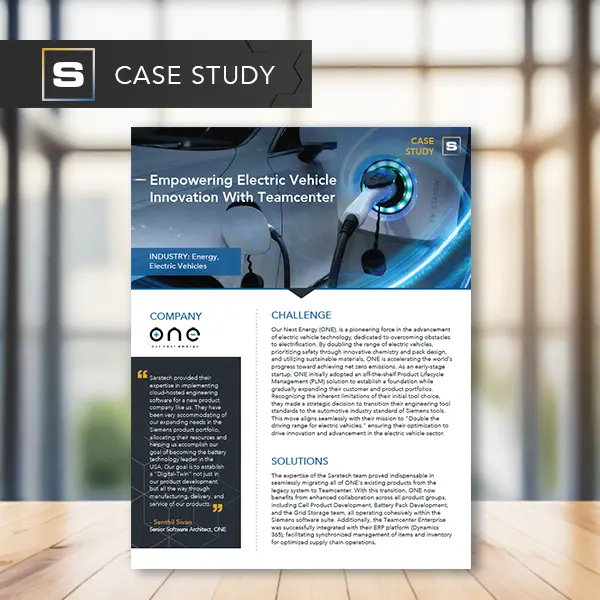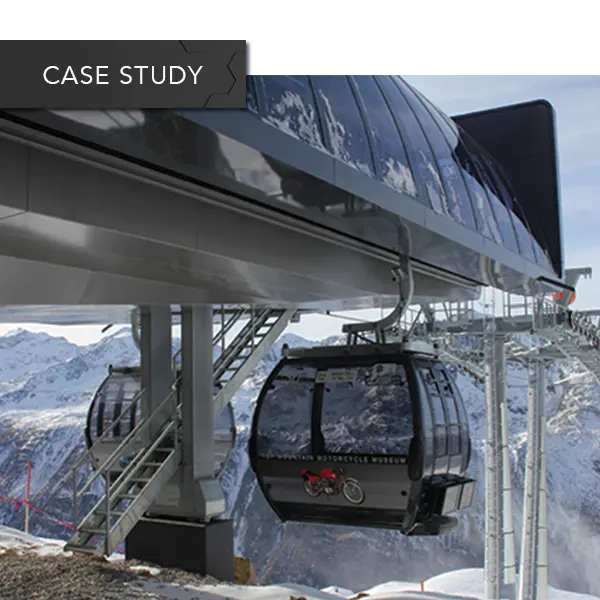Manage Your Engineering Data & Processes Better with Teamcenter PLM Solutions.
Schedule a discovery session to get started. Saratech will tailor the right PLM solutions for your business needs and budget.
Congratulations on Choosing Teamcenter PLM!
As a Saratech PLM customer, our goal is to get your system installed and running quickly and smoothly. We’ll first engage you with a simple structured questionnaire that captures your product development process needs. Using this information, we will design your Teamcenter installation by mixing, matching, and configuring our standard options. These options reflect our years of experience with Teamcenter installs. We can work with both on-premise and cloud-based infrastructure, and help you choose between them, if needed. Our team will then implement your Teamcenter PLM system using an Agile approach with project visibility, thorough system testing, and customer sign-off prior to go-live, and a hypercare period after go-live where we proactively monitor the system to ensure a smooth transition to your end-users. If needed, we also offer post-launch maintenance and help desk support.
Configurable Options
We will design your Teamcenter installation by mixing, matching, and configuring our standard options.
Engineering Process Support
CAD and Document Management
Part Naming and Organizations
BOM Management
Workflows and Change Management
Visualization
Reports
Auto pdf | jt creation
CAD Integrations
Supporting all CAD Integration
NX, SolidDesign, SolidWorks,
CATIA, Creo, AutoCAD
ECAD Integration, i.e. Altium
MFG Integration
MBOM | EasyPlan | MPP | EWI
Administrative
Admin Training
Organization and Access Control
Single Sign-on
VPN Setup
Multi-Environment Installation
Development
Quality Assurance
Production
Training
Why Saratech Is an Ideal Partner for Your Teamcenter PLM Project
At Saratech we partner with industry-leading software companies to provide our customers with the right solution for their product development needs. Our customers rely on us for world-class design, analysis, manufacturing, data, and process management software recommendations and deployments to stay ahead of the competition. We provide engineering expertise, services, software, and manufacturing solutions to improve your product development experiences. We help optimize engineering processes to accelerate product development and speed up time-to-market. For a successful implementation, Saratech is your ideal partner, providing:
1
Teamcenter Experience
We have been a Siemens Teamcenter PLM partner since our founding in 2008. Over this time, we have completed dozens of successful implementations of Teamcenter PLM, including Teamcenter, Teamcenter Rapid Start, and Teamcenter X, across multiple industries.
2
Technical Proficiency
Our technical experts include architects and PLM engineers who are proficient in configuration, customization, integration with other systems, and data migration.
3
Project Management Skills
All projects include a project manager to track and maintain deliverables, schedule, and budget. The project manager also communicates status via regular customer meetings.
4
Fast Time-to-Value
Our structured implementation process minimizes install and configuration time.
5
Capture of Your Unique Needs
Every company is different, so while we use a standard, structured approach for our Teamcenter implementations, our process accommodates capture and implementation of your business processes/workflows, business scalability needs and plans, and change management maturity.
6
Training and Support Services
We offer Teamcenter training to ensure that your end-users and administrators can use the system effectively. We also have post-launch support, including a standard hyper-care period where we proactively monitor the system for the first week or two after go-live, and we offer longer term help desk support services.
Teamcenter Deployment Options
Host, manage and support your Teamcenter PLM software with your IT team. We can help too.
Teamcenter on the cloud, with variety of hosting options, managed by your IT team or ours.
Deploy Teamcenter in a matter of weeks, using pre-configured workflows optimized for your industry.
Saratech Teamcenter Services
Understand current challenges, discuss requirements, and get started on the road to define your overall PLM strategy.
Transformation Strategy & Planning
Identify the best strategy to implement digital transformation for your organization. Our team will work with your stake holders and executives to clearly articulate your vision for PLM transformation, including purpose and benefits.
Define your PLM rollout strategy with detailed timeline and milestones. Coordinate and assign responsibilities and resources for a smooth rollout. Devise contingency plans to mitigate potential issues.
Every company's environment is different. Customization is necessary to get the most out of your Teamcenter deployment. We evaluate and identify inefficiencies then make adjustments to ensure your Teamcenter implementation is optimized for your organization.
Integrate Teamcenter with major MCAD, ECAD systems including NX, CATIA, Creo, SolidWorks and Inventor. Create seamless integration between Teamcenter and various systems to maximize efficiency.
Migrate your engineering data from flat files, home grown and other PLM systems into Teamcenter.
From system administration to user support, the Saratech team has the expertise and infrastructure in place to support your Teamcenter deployment. Having timely access to expert problem solvers allow your team to focus on product development.
Boost productivity with practical training on Teamcenter. Whether getting a new user up-to-speed or expanding the skills of your Teamcenter admin, Saratech will deliver the right training tailored to your requirements.
Get the Most Out of Your Teamcenter Implementation Investment, Maximize Benefits, and Realize Full Potential.
To get the most out of your Teamcenter implementation investment and maximize the benefits it can bring to your organization, consider the following best practices:
By following these best practices and tailoring the implementation to your organization's specific needs, you can maximize the return on your Teamcenter investment and realize the full potential of PLM in improving your product development processes and overall business performance.
CLEARLY DEFINE OBJECTIVES
Clearly define your goals and objectives for implementing Teamcenter. Understand what specific challenges you want to address and what outcomes you expect from the PLM system. Having clear objectives will help you focus on the areas that matter most to your organization.
THOROUGHLY ASSESS NEEDS AND REQUIREMENTS
Conduct a comprehensive assessment of your organization's PLM needs and requirements. Involve key stakeholders from different departments to understand their pain points and priorities. This will ensure that the implementation addresses the real needs of the business.
ENGAGE TOP MANAGEMENT SUPPORT
Secure support from top management and involve them in the decision-making process. Having executive buy-in ensures that the implementation receives the necessary resources and attention, and it sets the right tone for driving adoption across the organization.
CHOOSE THE RIGHT TEAM AND PARTNERS
Assemble a skilled and dedicated implementation team that includes experts from both your organization and the PLM vendor. Additionally, choose a reliable and experienced implementation partner, if needed, to guide you through the process.
PROPERLY PLAN AND SEQUENCE
Develop a detailed implementation plan, including a sequence of modules and functionalities to be deployed. Prioritize critical areas and plan a phased approach to implementation, ensuring smoother integration with existing processes and systems.
EFFECTIVE CHANGE MANAGEMENT
Understand that implementing PLM will likely bring changes to existing processes and workflows. Invest in change management efforts to prepare employees for these changes and address any resistance. Training and support are crucial to help users adapt to the new system.
DATA MIGRATION AND QUALITY
Ensure a smooth and accurate data migration from existing systems to Teamcenter. Pay attention to data quality and cleanup to avoid issues caused by inaccurate or redundant data.
PROMOTE USER ADOPTION
Actively promote user adoption and encourage employees to embrace the PLM system. Highlight the benefits of using Teamcenter and provide ongoing training and support to help users fully utilize its capabilities.
CONTINUOUS IMPROVEMENT
Treat Teamcenter implementation as an ongoing journey rather than a one-time project. Continuously review and optimize processes, collect feedback from users, and seek ways to improve the system's performance and functionality.
MEASURE AND TRACK SUCCESS
Establish key performance indicators (KPIs) to measure the success of your Teamcenter implementation. Regularly track these metrics to evaluate the system's impact on your organization's productivity, efficiency, and bottom line.
The PLM Process | Teamcenter Deployment Sequence
To determine the most suitable deployment sequence, organizations typically conduct a thorough assessment of their PLM needs, create a roadmap, and work with PLM consultants or experts to guide them through the implementation process. It is important to note that the deployment sequence can vary based on the organization's priorities, existing systems, and specific business needs. Some companies may choose to deploy additional custom or industry-specific modules based on their requirements.
A typical deployment sequence might include the following modules:
TEAMCENTER PRODUCT DATA MANAGEMENT (PDM)
The PDM module is the foundation of Teamcenter and is usually one of the first modules deployed. It involves storing, organizing, and managing product-related data, including 3D CAD models, documents, and other files. It establishes a centralized data repository and ensures that product information is accessible to relevant stakeholders.TEAMCENTER CHANGE MANAGEMENT
Once the PDM module is in place, the Change Management module can be deployed. This module focuses on managing changes to product data and processes, including change tracking, version control, and release management.TEAMCENTER WORKFLOW MANAGEMENT
Workflow Management is often deployed alongside Change Management or after it. This module enables the automation and optimization of business processes, ensuring that tasks are routed to the right people and completed in a timely manner.TEAMCENTER MANUFACTURING PROCESS MANAGEMENT (MPM)
The MPM module deals with managing manufacturing processes, such as process planning, work instructions, and resource allocation. It helps ensure a smooth transition from product design to production.TEAMCENTER REQUIREMENTS MANAGEMENT
This module focuses on capturing, managing, and tracing product requirements throughout the product development lifecycle. It helps ensure that products meet customer needs and comply with industry standards.TEAMCENTER SIMULATION AND VALIDATION
This module, if utilized, integrates with simulation and analysis tools to enable virtual testing and validation of product designs, reducing the need for physical prototypes.TEAMCENTER SUPPLIER COLLABORATION
Once the core modules are in place, Supplier Collaboration can be deployed to facilitate collaboration with suppliers and vendors, streamlining the supply chain processes.TEAMCENTER REPORTING AND ANALYTICS
The Reporting and Analytics module is often implemented alongside or after other modules to provide insights into product development processes, performance metrics, and data-driven decision-making.
Already Using Teamcenter? Discover How to Maximize Teamcenter PLM.
Benefits of PLM
Deploying a PLM system brings numerous benefits to an organization, ranging from increased collaboration and efficiency to improved product quality, compliance, and decision-making. It enables companies to stay competitive, innovate faster, and deliver high-quality products to market more effectively.
Improved Collaboration
PLM facilitates better collaboration among cross-functional teams, including designers, engineers, manufacturers, and suppliers. It provides a centralized platform for sharing product data, documents, and information, enhancing communication and decision-making.
Efficient Data Management
PLM centralizes product-related data, ensuring that the right information is accessible to the right people at the right time. This reduces data duplication, minimizes errors, and improves data accuracy and integrity.
Enhanced Product Development Process
PLM streamlines and automates product development processes, leading to faster time-to-market and increased innovation. It helps teams manage design changes, track revisions, and efficiently release new product versions.
Better Product Quality and Compliance
With PLM, organizations can enforce standardized processes and ensure that products meet regulatory requirements and customer specifications. It enables thorough documentation and traceability of product information.
REDUCED COST AND WASTE
PLM helps optimize product development processes, reducing rework, scrap, and unnecessary iterations. By avoiding delays and identifying potential issues early on, organizations can achieve cost savings.
Improved Supplier Collaboration
PLM allows for better collaboration with suppliers and vendors. It helps manage supplier data, track supplier performance, and ensure timely and accurate delivery of components.
Risk Mitigation
PLM helps identify and address potential risks early in the product development process. It allows for simulation and testing of product designs, reducing the likelihood of failures and recalls.
Increased Product Innovation
PLM provides a structured environment for capturing and managing ideas and feedback from various sources. This encourages innovation and the development of new and improved products.
Simplified Regulatory Compliance
PLM systems can help manage compliance with industry standards, regulations, and certifications. It assists in documenting adherence to specific requirements, making audits and certifications more manageable.
Better Decision Making
With access to real-time data and analytics, PLM enables data-driven decision-making at every stage of the product lifecycle. This leads to more informed and effective business decisions.
Lifecycle Traceability
PLM ensures that all product-related data and activities are recorded and can be traced back to their origins. This is crucial for maintaining a comprehensive history of the product throughout its lifecycle.
Teamcenter Case Studies
Empowering electric vehicle innovation and enhanced collaboration across all product groups with Teamcenter.
Korea's leading general foods company utilizes Teamcenter's comprehensive product data management tools to increase innovation and significantly reduce costs.
Teamcenter plays a vital role in creating cutting-edge cable-drawn transport systems enabling Doppelmayr to maintain a leading global market position.




